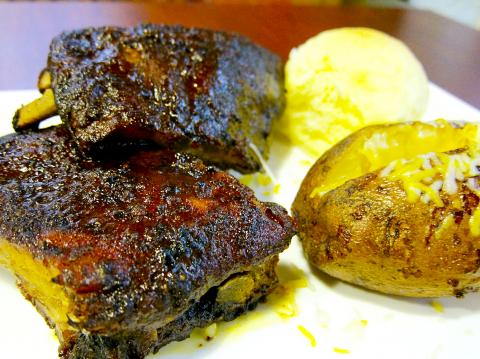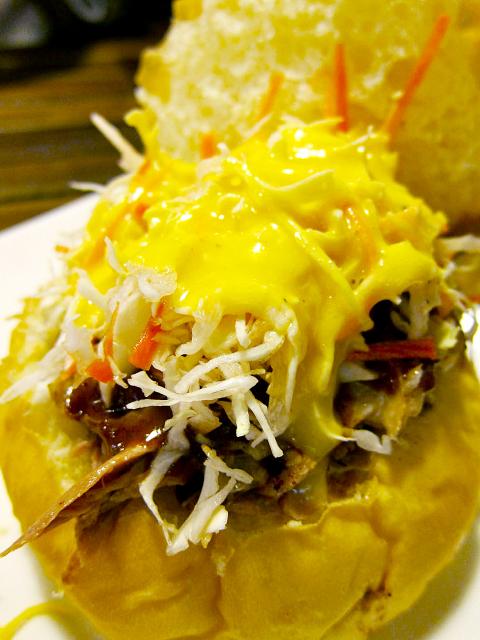Ed’s Diner, which opened six months ago in Dazhi near Miramar Entertainment Park (美麗華百樂園), serves up authentic American-style barbecue in hearty portions at reasonable prices. Operated by Brit Eddy Sweeney, the restaurant smokes its meat with longan wood, logs of which are stacked outside the restaurant. The interior of Ed’s Diner is simple but homey, with large windows and wooden folding chairs that give it a picnic-like atmosphere even at night.
The menu features barbecue chicken, pork, prime Angus beef brisket, ribs and a 14-ounce Angus beef bone-in prime steak. One of the most popular items is the pulled pork hamburger (NT$150 or NT$250 in a set meal with soup, salad, a bread roll, side dish and drink). The meat is piled into a hollowed-out white bread bun and topped with crunchy coleslaw. The sandwich was delicious and the sauce was sweet and tangy, while the coleslaw added just the right amount of creaminess. My companion was also happy with his large slice of tender Angus brisket (NT$330 for a set meal), though he wished the meat had been from a leaner cut (you can call ahead to Ed’s Diner to see if specific cuts of meat are available that day).
On a second visit, we requested an extra serving of the restaurant’s freshly prepared spicy hot barbecue sauce, which tasted delicious slathered on the brisket. The sauce is also served with the ribs, which are prepared with a dry rub made of herbs and spices. The barbecue ribs are sold in slabs and can be ordered a la carte (NT$450 for half a slab or NT$800 for a full slab) or in a set meal. On both nights we ordered ribs, every single bite was pleasingly tender, with not a hint of dryness on the entire slab.

Photo: Catherine Shu, Taipei Times
The menu features a selection of classic barbecue side dishes, like corn on the cob (NT$50 a la carte) and baked potato (NT$50). The slow smoked sweet potato (NT$50) was a good complement to my pulled pork sandwich, but I could have done without the melted cheese on top, which added very little flavor and obscured the sweet potato’s rich, savory flavor. The home baked beans (NT$50) take 12 hours to prepare and taste good, though my companion thought that the sauce was somewhat too thin. My favorite side dish was the home cut fries (NT$50), which the menu says takes two hours to make. The skin was crispy without being too oily and lightly salted. Every plate comes with a dinner roll, which we used to sop up the juices and leftover sauce from our ribs and brisket. The soup and salad served with set meals are forgettable and just give diners something to nibble on until the main course arrives.
The service at Ed’s Diner is extremely prompt and the food arrives quickly, so you don’t have to wait long. Meat is prepared in limited quantities each day. If you are craving a particular dish, make sure to call ahead to check its availability. Ed’s Diner is usually busy on weekend evenings. Reservations aren’t required but they are highly recommended.

Photo: Catherine Shu, Taipei Times

Under pressure, President William Lai (賴清德) has enacted his first cabinet reshuffle. Whether it will be enough to staunch the bleeding remains to be seen. Cabinet members in the Executive Yuan almost always end up as sacrificial lambs, especially those appointed early in a president’s term. When presidents are under pressure, the cabinet is reshuffled. This is not unique to any party or president; this is the custom. This is the case in many democracies, especially parliamentary ones. In Taiwan, constitutionally the president presides over the heads of the five branches of government, each of which is confusingly translated as “president”

Sept. 1 to Sept. 7 In 1899, Kozaburo Hirai became the first documented Japanese to wed a Taiwanese under colonial rule. The soldier was partly motivated by the government’s policy of assimilating the Taiwanese population through intermarriage. While his friends and family disapproved and even mocked him, the marriage endured. By 1930, when his story appeared in Tales of Virtuous Deeds in Taiwan, Hirai had settled in his wife’s rural Changhua hometown, farming the land and integrating into local society. Similarly, Aiko Fujii, who married into the prominent Wufeng Lin Family (霧峰林家) in 1927, quickly learned Hoklo (commonly known as Taiwanese) and

The Venice Film Festival kicked off with the world premiere of Paolo Sorrentino’s La Grazia Wednesday night on the Lido. The opening ceremony of the festival also saw Francis Ford Coppola presenting filmmaker Werner Herzog with a lifetime achievement prize. The 82nd edition of the glamorous international film festival is playing host to many Hollywood stars, including George Clooney, Julia Roberts and Dwayne Johnson, and famed auteurs, from Guillermo del Toro to Kathryn Bigelow, who all have films debuting over the next 10 days. The conflict in Gaza has also already been an everpresent topic both outside the festival’s walls, where

The low voter turnout for the referendum on Aug. 23 shows that many Taiwanese are apathetic about nuclear energy, but there are long-term energy stakes involved that the public needs to grasp Taiwan faces an energy trilemma: soaring AI-driven demand, pressure to cut carbon and reliance on fragile fuel imports. But the nuclear referendum on Aug. 23 showed how little this registered with voters, many of whom neither see the long game nor grasp the stakes. Volunteer referendum worker Vivian Chen (陳薇安) put it bluntly: “I’ve seen many people asking what they’re voting for when they arrive to vote. They cast their vote without even doing any research.” Imagine Taiwanese voters invited to a poker table. The bet looked simple — yes or no — yet most never showed. More than two-thirds of those